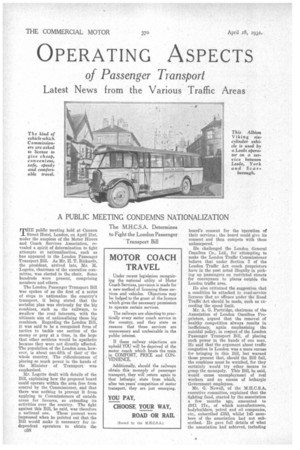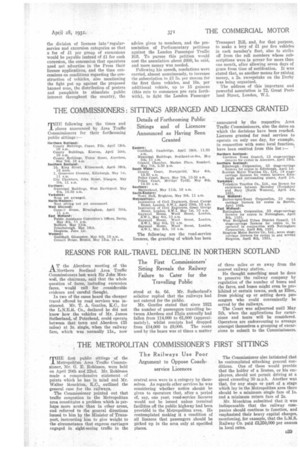OPERATING ASPECTS
Page 60

Page 61

If you've noticed an error in this article please click here to report it so we can fix it.
of Passenger Transport
Latest News from the Various Traffic Areas
. A PUBLIC MEETING CONDEMNS NATIONALIZATION
THE public meeting held at Cannon Street Hotel, London, on April 21st, under the auspices of the Motor Hirers and Coach Services Association, revealed a spirit of determination to fight attempts at nationalization, such as has appeared in the London Passenger Transport Bill. As Mr. H. T. Rickards, the president, arrived late, Mr. M. Logette, chairman of the executive committee, was elected to the chair. Some hundreds were present, comprising members and others.
The London Passenger Trcuisport Bill was spoken of as the first of a series of steps to nationalize the country's transport, it being stated that the socialist plan was obviously for the big combines, such as the railways, to swallow the road interests, with the ultimate aim of nationalizing those big combines. Regarding the London Bill, it was said to be a recognized form of tactics to tackle one section of the enemy or prey at a time, in the hope that other sections would be apathetic because they were not directly affected. The population of the London area, however, is about one-fifth of that of the whole country. The ridiculousness of placing so much power in the hands of the Minister of Transport was emphasized.
Mr. Logette dealt with details of the Bill, explaining how the proposed board could operate within the area free from control by the Commissioner, and that there was nothing to prevent it from applying to Commissioners of outside areas for licences, so extending its activities over the country. The fight against this Bill, he said, was therefore a national one. Thosepresent were impressed when he pointed out that the Bill would make it necessary for independent operators to obtain the
c38 board's consent for the bperation of their services ; the board could give its consent and then compete with them unhampered.
He challenged the London General Omnibus Co., Ltd., for attempting to make the London Traffic Commissioner believe that under Section 7 of the London Traffic Act coach proprietors have in the past acted illegally in picking up passengers on restricted streets for conveyance to places outside tho London traffic area.
He also criticized the suggestion that ft condition be attached to road-service licences that no offence under the Road Traffic Act should be made, such as exceeding the speed limit.
Mr. A. G. Partridge, chairman of the Association of London Omnibus Proprietors, argued that the removal of healthy competition always results in inefficiency, again emphasizing the suicidal policy, in respect of the London Passenger Transport Bill, of placing such power in the hands of one man. He said that the argument about traffic congestion in London was a mere excuse for bringing in this Bill, but warned those present that, should the Bill fail, the combines must be watched, for they certainly would try other means to grasp the monopoly. This Bill, he said, would cause unemployment of real workers and an excess of lethargic Government employees.
Mr. G. Nowell, of the M.H.C.S.A. executive committee, explained that the fighting fund, started by the association a few months ago, amounted to £911 17s., of which manufacturers, bodybuilders, petrol and oil companies, etc., subscribed £383, whilst 145 members of the association had not subscribed. He gave full details of what the association had achieved, including
the division of licences into regularservice and excursion categories so that a fee of 11 per group of excursions would he payable instead of £1 for each excursion, the concession that operators need not advertise in the Press their licence applications, and the time concessions on conditions regarding the construction of vehicles, also mentioning the fight put up against the proposed banned zone, the distribution of posters and pamphlets to stimulate public interest throughout the country, the advice given to members, and the presentation of Parliamentary petitions against the London Passenger Traffic Bill. To pursue this petition would cost the association about £600, he said, and more money was needed.
Following his speech, resolutions were carried, almost unanimously, to increase the subscription to £3 3s. per annum for the first three vehicles, and 10s. per additional vehicle, up to 15 guineas (this rate to commence pro rata forthwith), to fight the London Passenger Transport Bill, and, for that purpose, to make a levy of 11 per five vehicles in each member's fleet, also to strike off from the roll members whose subscriptions were in arrear for more than one month, after allowing seven days of grace from time of notification. It was stated that, as another means for raising money, a 2s. sweepstake on the Derby was being organized.
The address of this important and powerful association is 72, Great Portland Street, London, W.1.












































































































